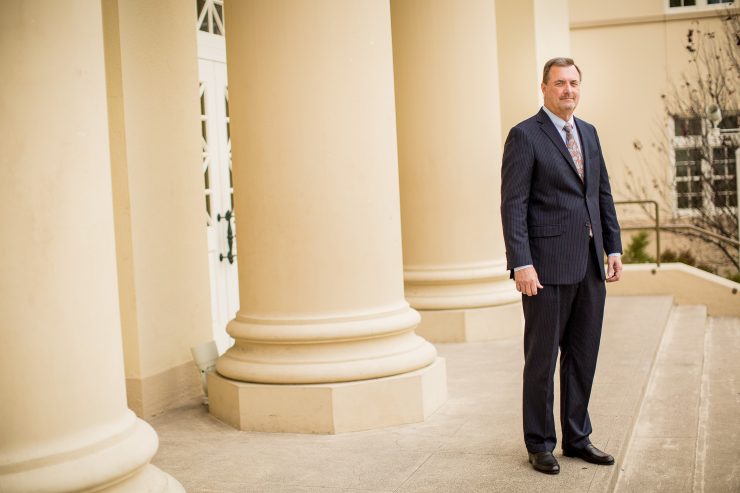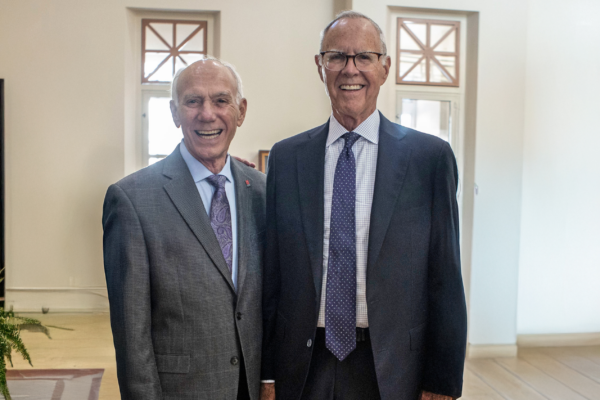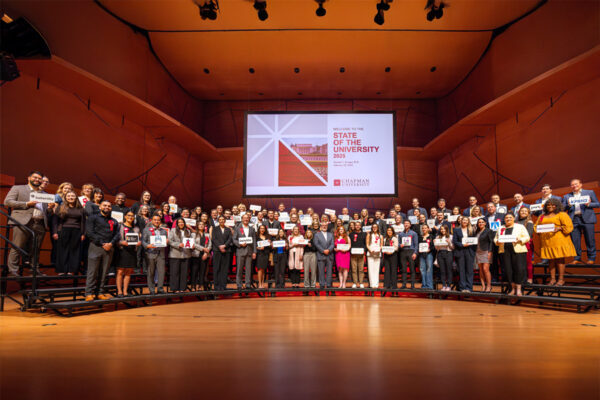Achievement marks the four-decade academic career of Glenn Pfeiffer. That has never been more true than during his tenure as Chapman’s provost and chief academic officer.
Over the past five years, the university has increased the number of women and people of color in key academic leadership positions; earned recognition as a center of “high research activity” by the Carnegie Classification; launched the Fowler School of Engineering and opened the state-of-the-art Keck Center for Science and Engineering. Pfeiffer could point to any of these milestones or others as a measure of his success.
Instead, he chooses to highlight the day-to-day work happening throughout the Chapman community, ensuring that each student and faculty member has an opportunity to succeed.
Recruiting and Empowering High-Quality Faculty
“First and foremost, Chapman is a student-centered university,” says Pfeiffer, who in June will retire from his administrative duties to resume his role as a professor of accounting in the Argyros School of Business and Economics.
“A hallmark of our faculty is that they care about our students, and as they create scholarly or creative programs, we want them to have the support to be successful,” he adds. “One reason we have such a good faculty is that for the most part we’ve done a good job of recruiting and empowering people who fit well into the Chapman University environment and support our mission.”
As he prepares to leave administration, Pfeiffer reflects on his time as provost. He also looks toward the next chapter in his academic journey, which includes work on the seventh edition of his widely hailed textbook “Financial Accounting.”
What have been the biggest challenges of your time as provost and chief academic officer?
“Dealing with all the effects of the COVID-19 pandemic has been the greatest challenge. We’ve followed state and county guidelines through each step in the process, and we’ve been conservative in bringing students back to campus. But we’re also committed to in-person instruction whenever possible within the guidelines. The university has spent an enormous amount to make our campus as safe as possible, and also to develop technology for remote-learning that’s effective and rewarding. As we’ve brought back to campus some in our community, last week we processed more than 2,000 COVID tests with only 10 positive results – none linked to on-campus contact. I think that speaks to the careful and comprehensive approach we’ve taken.”
What have you liked most about being provost?
“A highlight of the job is interviewing new faculty prospects. I like learning about their research, which feeds my own intellectual curiosity and allows me to find out what they’re passionate about. That’s important because they’re going to have to convey that information and that passion to their students.”
In what area have you achieved success that hasn’t garnered lots of attention?
“I’m pleased that we’ve been able to support our junior faculty, because the momentum they build early in their careers can lead to great innovation as they progress. Each of these professors undergoes a review in their second year, and if they’re on the right track, they get a course off in their third year. By reducing their teaching load, we allow them to get their research programs going. That gives them a leg up on success, which also serves our students and our community.”
What has surprised you about the experience?
“It’s not a surprise, but during this time when so many in the Chapman community have been away from campus, we’ve seen how important those casual interactions are – passing someone in a hallway or on a sidewalk, having a conversation, building connections that lead to understanding. So for me, this moment has laid bare the challenges of effective communication. Then, during my five years in this administrative role, I’ve learned so much about the importance of listening to all the voices in our community and understanding their concerns. We’ve worked hard to make Chapman a tremendous asset to Orange and the wider community, and we’re continuing to work to make it an even better environment.”
As you prepare to go back into the classroom, what excites you about teaching accounting and resuming your research?
“One thing I love about accounting is changing preconceived notions. People think it’s boring, and it’s not. It’s about conveying important financial information to people who aren’t accountants. That information helps us run organizations more effectively. So often students come in thinking it’s going to be a boring class, but if I could do a student evaluation after that first class, those students would be uniformly excited. Now I’m not sure I always deliver on that excitement down the road, but I’m passionate about helping to create that spark.”




